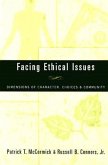Almost weekly we hear about corporate and government leaders breaching ethical and moral standards. Indeed, in recent years, corporate corruption and the misrepresentation of the truth has, at times, appeared overwhelming. At the very least, corporate and government scandals suggest that we have a crisis in leadership. This research investigated what some leaders in the corporate arena, who self-identify as having a strong spiritual foundation, had to say about the impact of their foundation on how they approached leadership, in general, and ethical issues, in particular. The research questions that guided this study were: (1) how did self-identified spiritual corporate leaders describe their spirituality? (2) what spiritual practices did they use to develop their spirituality? and (3) what leaders, who claim to have a rich spiritual life, say about the impact of spirituality on their ethical leadership practice? The results of this research mirrored that of Mitroff and Denton (1999). All of the individuals who participated in this research study explained that their spirituality was an important part of their leadership practice. Also the framework of spirituality in their leadership practice provided guidance in making moral and ethical decisions. What is interesting is that the results were the same in spite of different religious affiliations, and included those who did not identify with an organized religion. These findings suggest that it is imperative for MBA programs to address ethical issues from a spiritual perspective while steering clear of sectarian commitments.
Hinweis: Dieser Artikel kann nur an eine deutsche Lieferadresse ausgeliefert werden.
Hinweis: Dieser Artikel kann nur an eine deutsche Lieferadresse ausgeliefert werden.





![Messianic Prohecy Vindicated, or, An Explanation and Defence of the Ethical Theory [microform] Messianic Prohecy Vindicated, or, An Explanation and Defence of the Ethical Theory [microform]](https://bilder.buecher.de/produkte/66/66134/66134055m.jpg)

![The Ethical Teachings of Jesus [microform]; The Ethical Teachings of Jesus [microform];](https://bilder.buecher.de/produkte/66/66161/66161023m.jpg)
